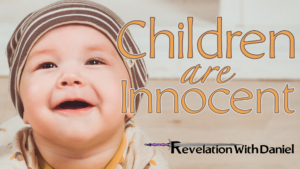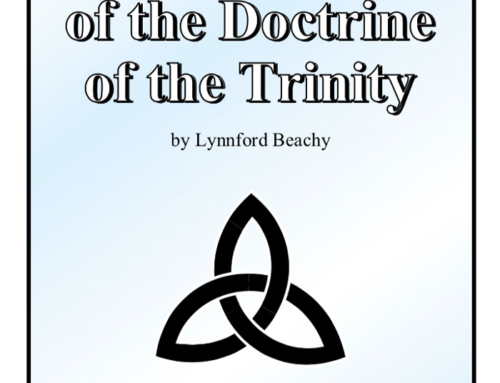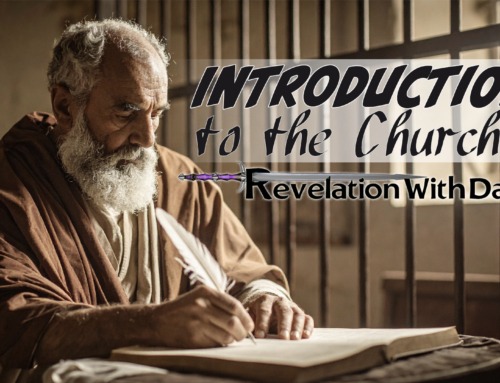PDF Notes (Video below)
 James 4:17 To him that knoweth to do good, and doeth it not, to him it is sin.
James 4:17 To him that knoweth to do good, and doeth it not, to him it is sin.
Question: do babies know to do good or evil? If not, are babies “dead to sin?” (Romans 6:2)
Deuteronomy 1:39 Moreover your little ones, which ye said should be a prey, and your children, which in that day had no knowledge between good and evil, they shall go in thither, and unto them will I give it, and they shall possess it.
-
-
- Numbers 14:31 But your little ones, which ye said should be a prey, them will I bring in, and they shall know the land which ye have despised.
-
- Numbers 14:29 Your carcases shall fall in this wilderness; and all that were numbered of you, according to your whole number, from twenty years old and upward, which have murmured against me,
-
- Numbers 14:31 But your little ones, which ye said should be a prey, them will I bring in, and they shall know the land which ye have despised.
-
Question: though God’s people said their children would be a prey, God said they would not be and would go into the Canaan land; who was right?
Isaiah 7:14-16 Therefore the Lord himself shall give you a sign; Behold, a virgin shall conceive, and bear a son, and shall call his name Immanuel. 15 Butter and honey shall he eat, that he may know to refuse the evil, and choose the good. 16 For before the child shall know to refuse the evil, and choose the good, the land that thou abhorrest shall be forsaken of both her kings.
Question: was there a time where the Child of the virgin didn’t know to choose good over evil?
-
-
- This timeframe, when a child does not know between good and evil, is commonly known as ‘before the age of accountability.’ Someone is not accountable for what they honestly didn’t know, or could not have known. A baby knows nothing about forgery, adultery, stealing, lies, and murder. After the brain has absorbed information through their life’s experience, a child would start to understand what is right and what is wrong, with opportunities to choose between either. The child at that point would be accountable for what they understand (stealing or lying are sins commonly understood at a young age).
- The Son of God was completely divine (begotten of His Father), and was brought forth (begotten, or born) again into a human nature. All other humans in this world of sin have been born with only a human nature. We are called to be “partakers of the divine nature, having escaped the corruption that is in the world through lust” (2 Peter 1:4). It is when we are “born again” that we are offered all the same help that the Son of God had at His disposal, with no disadvantages.
-
Romans 9:11 (For the children being not yet born, neither having done any good or evil, that the purpose of God according to election might stand, not of works, but of him that calleth;)
Question: (Same thoughts in Deut 1 and Isa 7 – being three witnesses) in the judgment, would it be fair to condemn anyone who had not “done any good or evil?” We’re not judged by grace or our nature, we’re judged by our works (see 2 Corinthians 5:10).
Jeremiah 31:15-17 Thus saith the LORD; A voice was heard in Ramah, lamentation, and bitter weeping; Rahel weeping for her children refused to be comforted for her children, because they were not. 16 Thus saith the LORD; Refrain thy voice from weeping, and thine eyes from tears: for thy work shall be rewarded, saith the LORD; and they shall come again from the land of the enemy. 17 And there is hope in thine end, saith the LORD, that thy children shall come again to their own border.
-
-
- Matthew 2:16-18 Then Herod, when he saw that he was mocked of the wise men, was exceeding wroth, and sent forth, and slew all the children that were in Bethlehem, and in all the coasts thereof, from two years old and under, according to the time which he had diligently enquired of the wise men. 17 Then was fulfilled that which was spoken by Jeremy the prophet, saying, 18 In Rama was there a voice heard, lamentation, and weeping, and great mourning, Rachel weeping for her children, and would not be comforted, because they are not.
-
Question: parents were told to refrain from weeping after their children “were not.” Why? Because they have the Word of God telling them that they will go into the Canaan land!
Psalms 51:5 Behold, I was shapen in [not as] iniquity; and in [not as] sin did my mother conceive me.
-
-
- 1 John 3:4 Whosoever committeth [verb] sin [noun] transgresseth [verb] also the law: for sin [noun] is the transgression [verb] of the law.
-
Question: who did the shaping and conceiving, David as sperm or the mother? If it was the mother, who was the guilty party in this scenario?
Psalms 58:3 The wicked are estranged from the womb: they go astray as soon as they be born, speaking lies.
-
-
- In this setting, the children would have been influenced by their parent(s) from the womb, thereby a “stranger” from God. (Stranger is the first way the Hebrew word “estranged” is translated in Exodus 29:33.) Each parent has an extremely high calling to influence their children from the womb to become either associated with or strangers from God.
-
Question: do babies ‘go astray… speaking lies’ from the time they are born? Could the generational curses in the Commandments fit in here as inherited tendencies and propensities? “…visiting the iniquity of the fathers upon the children unto the third and fourth generation of them that hate me.” Exodus 20:5b
-
-
- Jeremiah 31:29-30 In those days they shall say no more, The fathers have eaten a sour grape, and the children’s teeth are set on edge. 30 But every one shall die for his own iniquity: every man that eateth the sour grape, his teeth shall be set on edge.
- Ezekiel 18:2-4 What mean ye, that ye use this proverb concerning the land of Israel, saying, The fathers have eaten sour grapes, and the children’s teeth are set on edge? 3 As I live, saith the Lord GOD, ye shall not have occasion any more to use this proverb in Israel. 4 Behold, all souls are mine; as the soul of the father, so also the soul of the son is mine: the soul that sinneth, it shall die.
-
Isaiah 48:8 Yea, thou heardest not; yea, thou knewest not; yea, from that time that thine ear was not opened: for I knew that thou wouldest deal very treacherously, and wast called a transgressor from the womb.
Question: this person is called a transgressor in what context?
-
-
- In this context the verses before are speaking about Jacob becoming Israel (a reference to Jacob’s conversion as an adult), and that conversion having occurred after Jacob had been proven a liar. Verse one says that Jacob called Israel would “make mention of the God of Israel, but not in truth, nor in righteousness.” The context speaks of a nation being called a transgressor from the womb when being born again! God’s people on earth, the church as a whole, needed conversion, so it doesn’t seem right to apply this text to children under the age of accountability.
- Here is a quote one paragraph earlier from where EGW used the verse in question, “Who can now feel sure that they are safe in respecting the voice of the General Conference Association? If the people in our churches understood the management of the men who walk in the light of the sparks of their own kindling, would they respect their decisions? I answer, No, not for a moment.” 1888 1567.2
- Consider the fact that the Bible asks if a nation can be born: see, Isaiah 66:8. The obvious answer is yes, and a nation can be born again—converted.
-
Jeremiah 1:5 Before I formed thee in the belly I knew thee; and before thou camest forth out of the womb I sanctified thee, and I ordained thee a prophet unto the nations.
Question: in light of the word “sanctify” meaning to set apart for a holy purpose, can we find any references to God sanctifying an unrepentant sinner?
-
-
- So, what by default is the child in the womb? The child is innocent, having done neither wrong nor right, the child is not a sinner.
-
Hosea 13:12-14a The iniquity of Ephraim is bound up; his sin is hid. 13 The sorrows of a travailing woman shall come upon him: he is an unwise son; for he should not stay long in the place of the breaking forth [birth] of children. 14 I will ransom them from the power of the grave; I will redeem them from death.
Question: the Hebrew word for “breaking forth” is also translated “birth.” So then, could we believe that the words “ransom” and “redeem” in this context of children means that they will be saved from “the grave” and “from death?”
Matthew 18:2-3 And Jesus called a little child unto him, and set him in the midst of them, 3 And said, Verily I say unto you, Except ye be converted, and become as little children, ye shall not enter into the kingdom of heaven.
Question: does this scenario prove that Jesus Christ believed that little children were like a man converted and will be in the Kingdom of Heaven? (See Matthew 19:14)
1 Corinthians 7:14 The unbelieving husband is sanctified by the wife, and the unbelieving wife is sanctified by the husband: else were your children unclean; but now are they holy.
Question: since this is not talking of babies, does this verse say that unsanctified parents bring up unclean children, while believing parents bring up holy children?
What does the Bible define sin as? In other words, “sin is” what?
-
-
- Genesis 18:20 And the LORD said, Because the cry of Sodom and Gomorrah is great, and because their sin is very grievous;
-
- And they called unto Lot, and said unto him, Where are the men which came in to thee this night? bring them out unto us, that we may know them. (Genesis 19:5)
-
- Psalms 32:1 Blessed is he whose transgression is forgiven, whose sin is covered.
- Psalms 51:3 For I acknowledge my transgressions: and my sin is ever before me.
- Proverbs 14:34 Righteousness exalteth a nation: but sin is a reproach to any people.
- Hosea 13:12 The iniquity of Ephraim is bound up; his sin is hid.
- John 8:34 Jesus answered them, Verily, verily, I say unto you, Whosoever committeth sin is the servant of sin.
- Romans 5:13 (For until the law sin was in the world: but sin is not imputed when there is no law.
-
- Therefore to him that knoweth to do good, and doeth it not, to him it is sin. (James 4:17)
-
- Romans 6:23 For the wages of sin is death; but the gift of God is eternal life through Jesus Christ our Lord.
- 1 Corinthians 15:56 The sting of death is sin; and the strength of sin is the law.
- 1 John 3:4 Whosoever committeth sin transgresseth also the law: for sin is the transgression of the law.
- 1 John 3:8 He that committeth sin is of the devil; for the devil sinneth from the beginning. For this purpose the Son of God was manifested, that he might destroy the works of the devil.
- Genesis 18:20 And the LORD said, Because the cry of Sodom and Gomorrah is great, and because their sin is very grievous;
-
Babies do not have a mind; they have a brain. Their infant brains have not developed a mind of their own as of yet. Infants have preferences by nature, like they want to eat, but that is inherent as a God given instinct to stay alive. Because a baby cries to eat does not mean a baby is sinning in expressing a selfish nature—though the nature is selfish by default (thanks to Adam listening to Eve). That selfish expression for an infant is not accounted as sin because the infant does not know the difference between what is right and wrong (see Deuteronomy 1:39 above). If your twenty-four year old son is selfishly crying because lunch is a few minutes late, then there’s a sin problem.
The Bible uses the term “carnal mind” (Romans 8:7) so a spiritual mind would be the converse, though the Bible never uses the phrase. Read Romans 8:1-11 for a sense of what is being said about the two. The entire context of the book of Romans demands the subjects who are either carnal or spiritual to be adults who have chosen either to follow God (having a spiritual mind) or not (having a carnal mind).
To say that babies have a “carnal mind” from the womb is going beyond the scope of the Bible. Minds are developed and must be renewed (see Romans 12:1-2) in every one of us who have been born with a sinful nature, not partaking of the divine nature. Christ partook of the likeness of our “sinful flesh” (Romans 8:3), which proves that the sinful flesh that Christ partook of is not sin or condemned. Christ became “sin for us, who knew no sin; that we might be made the righteousness of God in him” (2 Corinthians 5:21), but that was not at His birth, that was at His death. (In the Garden of Gethsemane sin was ‘confessed’ upon Christ, the “Lamb of God” (John 1:29), so He would bear those sins to His death in our place. See John 3:16 and Romans 5:8-10.)
EGW quotes from the search “innocent children”
“His spirit, wearied with the bustle and confusion of the crowded city, tired of association with crafty and hypocritical men, found rest and peace in the society of INNOCENT CHILDREN. His presence never repulsed them.” GW92 404.3
Question: the spirit in ‘innocent children’ was not repulsed from the purity in Christ… so, what spirit must be with them?
“Others, more mercifully dealt with, were shot down in cold blood, as, unarmed and helpless, they fell upon their knees in prayer. Hundreds of aged men, defenseless women, and INNOCENT CHILDREN were left dead upon the earth at their place of meeting.” GC 271.3
Question: would the Lord withdraw access to His kingdom from someone who is considered an ‘innocent child?’
“Herod, who slew the INNOCENT CHILDREN of Bethlehem that he might destroy the King of Israel…” GC 667.2
Question: will the Lord send ‘innocent children’ to burn with the likes of Herod after the 1,000 years of Revelation 20?
“Men and women have no right to follow impulse, or blind passion, in their marriage relation, and then bring INNOCENT CHILDREN into the world to realize from various causes that life has but little joy, but little happiness, and is therefore a burden.” 2SM 421.2
Question: what kind of children do impulsive, blind and impassioned people bring into the world?
“Thus has this class perpetuated their deficiencies, and cursed their posterity with poverty, imbecility, and degradation. These should not have married. At least, they should not have brought INNOCENT CHILDREN into existence to share their misery, and hand down their own deficiencies, with accumulating wretchedness, from generation to generation, which is one great cause of the degeneracy of the race. 2SM 421.3
Question: what kind of children do deficient, poverty stricken, imbecile, couples bring into this world?
“Did [Agrippa] think of his great-grandfather Herod, and the massacre of the INNOCENT CHILDREN of Bethlehem?” 6BC 1066.10
“They recalled the terrible massacre of INNOCENT CHILDREN by the cruel Herod in hope of destroying the king of Israel.” 2SP 34.1
Question: again, what kind of children were massacred when Christ was young?
“You know what these commandments are as well as I do. I love your soul and the soul of your wife and the souls of your INNOCENT CHILDREN, and this is why I now address you. Consider carefully the way your feet are tending. I have more to say, but not now. Will you please to answer me, and return to me the letter containing the dream, as I requested. 5T 628.2
Yours with much sorrow and pity and love.” 5T 628.3
Question: the man being spoken to had lost his way… how did EGW refer to his children?
“We have also Bro. R. and his wife with four helpless children. He does his level best to support his INNOCENT CHILDREN, but they are in want all the time.” WM 331.1
Question: the man being spoken about is a faithful brother with what kind of children?
“Satan has tempted human beings to disregard the law of marriage as a thing unholy, but at the same time he has opened the door for the indulgence of human passion. Thus have come into existence some of the greatest evils which curse our world,—adultery, fornication, and the murder of INNOCENT CHILDREN born out of wedlock.” BEcho August 28, 1899, par. 5
Questions: what kind of children are murdered while born out of unholy wedlock? Could a baby born out of wedlock say, “Behold, I was shapen in iniquity; and in sin did my mother conceive me?” (Psalms 51:5).
“It is painful to reflecting minds to thus see INNOCENT CHILDREN, as well as those of mature age, dressed like victims for sacrifice, in order to make a display.” HR March 1, 1874, par. 9
Question: what are children called when inappropriately dressed in cold temperatures by their parents?
“You will find the little children will be apt learners, for they have clear minds and can recognize the truth and purity of the Scriptures. Their quaint thoughts will burst forth now and then like buds in the springtime, fresh and original. Lt26-1879.3
God loves the INNOCENT CHILDREN. If Jesus and heavenly things are connected with and woven into their feelings and fancies, they will receive upon the tablets of the heart the lessons of heaven and eternity. No man can receive the kingdom of heaven except it be with the SPIRIT OF A LITTLE CHILD.” Lt26-1879.4
Question: are innocent children apt learners, having clear minds, being able to recognize truth and the purity of the Scriptures?
“We think we can see a way to remedy this evil. In presenting this matter I appeal to you mothers to give your children a right education. First they must be taught that they cannot have their own way. Teach them from the cradle that all stimulants should be abhorred. They should not be educated as we often see in Basel. While the servants are out promenading with the children who have been entrusted to their care, they are often seen entering the places where wine and beer can be had, and they give to the INNOCENT CHILDREN that which in afteryears will cause them to fill drunkards’ graves. Thus they are giving them an education that will pervert their appetites, and when older they will depend on these stimulants. Little by little they are overcome and are placed out of the reach of help.” Ms26-1887.12
Question: do influences from the cradle affect the lives of innocent children to potentially lead them in the wrong direction in afteryears?
“We shall now speak of a work that is left undone. In sending children to the common schools, parents are placing them under demoralizing influences—influences that corrupt morals, habits, ways, and manners. They are, as it were, being nurtured in a den of thieves, among corrupters of habits and practices. They receive instruction of such a character that they are trained to be enemies of Christ. They lose sight of true piety and virtue. The baneful influence of vile-hearted boys and girls who practice the most degrading habits—boys and girls who are experts in sin—permeates the schools and has a degrading power over INNOCENT CHILDREN. And the children playing on the street are also obtaining a training that thoughtless parents will sometime learn leads to recklessness and lawlessness.” Ms129a-1901.1
Question: Godly education is important, yet is it paramount that parents also give their children the very best influences in their younger years to keep them from corruption of true piety and virtue?
“Parents have a more serious charge than they imagine. The inheritance of children is that of sin. Sin has separated them from God. Jesus gave His life that He might unite the broken links to God. As related to the first Adam, men receive from him nothing but guilt and the sentence of death. But Christ steps in and passes over the ground where Adam fell, enduring every test in man’s behalf. He redeems Adam’s disgraceful failure and fall by coming forth from the trial untarnished. This places man on vantage ground with God. It places him where, through accepting Christ as his Saviour, he becomes a partaker of the divine nature. Thus he becomes connected with God and Christ.” Lt68-1899.15
Question: in light of all that has been presented from the Bible and EGW before this, can we now see that, though children were separated from God in Adam’s choice, they were given a Savior to continue on as innocent until they knew between good and evil—giving them a choice to either be saved or lost?
-
-
- You’ll notice that the inheritance is not SIN, but THAT OF sin—through their unfaithful parents.
- As soon as there was sin, there was a Savior.
-
“If before the birth of her child she is self-indulgent, if she is selfish, impatient, and exacting, these traits will be reflected in the disposition of the child. Thus many children have received as a birthright almost unconquerable tendencies to evil. But if the mother unswervingly adheres to right principles, if she is temperate and self-denying, if she is kind, gentle, and unselfish, she may give her child these same precious traits of character.” AH 256.1-2






Pastor Mesa,
I remember asking this question to you some months ago and you directed me to a video which still left me with some questions on this subject.
This video answers all my questions plus gave additional information to help me understand our Great Father and His only begotten Son Jesus the Christ.
I am blessed to follow your ministry. God blesses you in your knowledge that you give to us.
All glory to God
Amen! 🙌🏼 Glory to God.